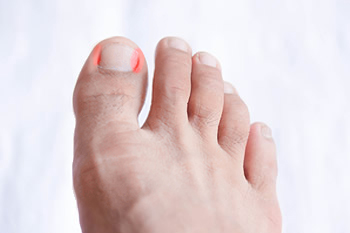The Three Stages of an Ingrown Toenail
Tuesday, 06 July 2021 00:00Ingrown toenails occur when the edge of a nail grows into the surrounding skin rather than over it. An ingrown toenail can be classified into one of three categories based on its severity. A Stage 1 ingrown toenail is characterized by the end of the toe becoming red and mildly swollen, warm, or painful to the touch, but with no pus or drainage. A Stage 2 ingrown toenail is characterized by increased redness, swelling, and pain, white or yellow-colored pus or drainage from the area, and infection. A Stage 3 ingrown toenail will usually have even more severe redness and swelling, be very painful, and be accompanied by an overgrowth of skin around the toenail. More severe infection and a fever may follow. If you frequently experience ingrown toenails, or if your toenail is showing signs of infection, it is suggested that you seek the care of a podiatrist as soon as possible.
Ingrown toenails can become painful if they are not treated properly. For more information about ingrown toenails, contact Dr. Steven Schwartz of Pennsylvania. Our doctor can provide the care you need to keep you pain-free and on your feet.
Ingrown Toenails
Ingrown toenails occur when a toenail grows sideways into the bed of the nail, causing pain, swelling, and possibly infection.
Causes
- Bacterial infections
- Improper nail cutting such as cutting it too short or not straight across
- Trauma to the toe, such as stubbing, which causes the nail to grow back irregularly
- Ill-fitting shoes that bunch the toes too close together
- Genetic predisposition
Prevention
Because ingrown toenails are not something found outside of shoe-wearing cultures, going barefoot as often as possible will decrease the likeliness of developing ingrown toenails. Wearing proper fitting shoes and using proper cutting techniques will also help decrease your risk of developing ingrown toenails.
Treatment
Ingrown toenails are a very treatable foot condition. In minor cases, soaking the affected area in salt or antibacterial soaps will not only help with the ingrown nail itself, but also help prevent any infections from occurring. In more severe cases, surgery is an option. In either case, speaking to your podiatrist about this condition will help you get a better understanding of specific treatment options that are right for you.
If you have any questions please feel free to contact our offices located in Chambersburg, and Mcconnellsburg, PA . We offer the newest diagnostic and treatment technologies for all your foot and ankle needs.


